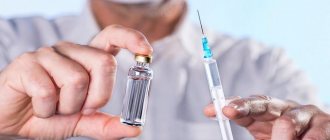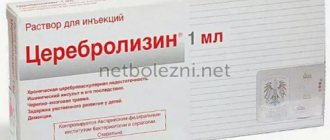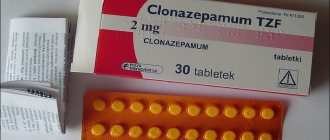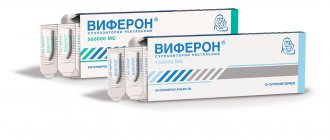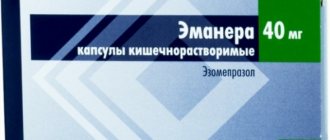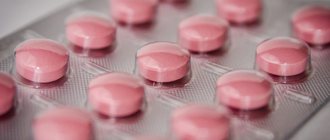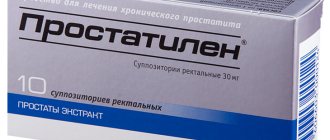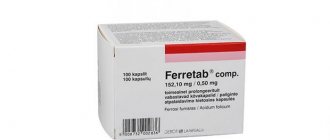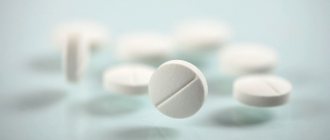Papaverine injection medicine is used to relieve spasms and relieve pain. The form of release of the medicine is different, however, they are the ones most often used. Injections are much more effective because they spread faster in the body, and therefore relieve unpleasant symptoms of diseases much better. The use of Papaverine together with other drugs that also relieve spasm and pain will help increase the effect of the drug. The ease of administration and speed of influence makes it possible to instantly achieve the desired result and cope with the painful condition.
Composition, physical and chemical properties, price
Available in three forms: rectal suppositories (suppositories), tablets, solution for injection.
| Pills | Solution 2% (Papaverine in ampoules) | Suppositories | |
| Main substance | 10 or 40 mg of papaverine hydrochloride in 1 tablet. | 20 mg of papaverine hydrochloride in 1 ml of solution - 2 ml of solution in 1 ampoule | 20 mg papaverine hydrochloride |
| Excipients | Sugar, starch, stearic acid, talc | Edetate disodium, L-methionine, water for | Semi-synthetic glycerides up to 2 g |
| Physicochemical characteristics | White tablets with two perpendicularly located marks dividing the tablet into 4 equal parts | Clear solution, colorless or slightly yellowish | Torpedo-shaped suppositories, solid. White. Without smell. |
| Package | 10 pcs. in contour cell blisters. In cardboard packs of 1-3 blisters | 5 or 10 ampoules in cardboard packages | 5 suppositories in polyethylene blisters. 2 blisters per cardboard package |
| Price | 40 mg No. 10 – 10-40 rub. | No. 10 – 35-50 rub. | No. 10 – 35-70 rub. |
Release conditions and storage
Papaverine tablets can be purchased freely in pharmacies; ampoules are dispensed according to prescriptions issued by the attending physician.
Comment! The pills are very bitter, so you should not chew them. They are taken 30 minutes before meals, washed down with plenty of water.
The medicine is inexpensive. A package of tablets costs about 20 rubles, a package of 10 ampoules costs about 50 rubles, candles cost 70-80 rubles.
In an apartment, the shelf life of the medicine is 3 years. Upon completion, the medicine must be disposed of. Requirements for the place of storage of tablets, ampoules:
- air temperature not higher than 25 °C;
- lack of sunlight.
The packaging of the medicine should not be thrown away during storage. It shows the production and expiration dates.
Important! Candles are stored in the refrigerator. 5-8 °C is the temperature at which they do not melt.
pharmachologic effect
Papaverine hydrochloride is an inhibitor (inhibiting) of the phosphodiesterase enzyme and leads to the accumulation of cyclic 3,5-adenosine monophosphate, a decrease in calcium levels inside cells, which causes impaired contractility of muscle fibers and relaxation of the smooth muscle structures of internal organs and blood vessels. In average therapeutic doses it has no effect on the central nervous system. In high doses, it leads to a decrease in the excitability of cardiac muscle tissue and slows down the speed of intracardiac conduction. A special feature of the drug is the absence of a paralytic effect - the muscles only relax, while their movements and functions are completely preserved.
In addition to the antispasmodic effect, the drug has a moderate local analgesic effect and is characterized by minor hypotensive and sedative properties.
Analogs
Pharmacies have drugs with similar medicinal properties and composition. These are antispasmodics prescribed by pediatricians, obstetricians-gynecologists, urologists, proctologists:
- No-Shpa (pills, ampoules, suppositories);
- Spasmol (pills, ampoules);
- Nosh-Bra (pills);
- Spakovin (ampoules).
A similar result is achieved when treating with Bencyclane, Dibazol (pills, ampoules), Theophylline. Papaverine has no generics. All of the listed drugs differ in composition.
A similar active ingredient is included in combination preparations: Platyfillin (ampoules), Papazol (pills), Andipal (pills). There are homeopathic Viburcol suppositories. They reduce pain, relieve spasms, and are used in extreme heat. For epilepsy, high blood pressure, threat of miscarriage, inject Magnesia.
Indications
- spasms of smooth muscles;
- spasms of the gastrointestinal tract due to cholecystitis, spastic colitis;
- pylorospasm;
- renal colic;
- peripheral vascular spasms;
- spasms of central nervous system vessels;
- spasms of heart vessels against the background of angina pectoris and hypertensive crisis (as part of complex treatment);
- urinary retention due to urinary tract spasm;
- bronchospasm.
Prescribed as an auxiliary drug for premedication before surgical interventions on the gastrointestinal tract, proctological and urological procedures.
When is the medicine used?
Treatment with this pharmaceutical drug is carried out for the following diseases and conditions:
- In inflammatory processes in the gall bladder, kidneys, esophagus and other abdominal organs;
- For endarteritis and vascular diseases of the brain;
- At high temperatures (in combination with other agents);
- For heart ailments;
- For bronchospasms and severe cough.
In addition, pharmaceuticals are often used as an additional drug to prepare patients for medical research and surgical operations.
Papaverine during pregnancy
Suppositories with Papaverine during pregnancy are quite often prescribed by doctors. The main reason for prescribing the drug is uterine hypertonicity, which is known to be one of the causes of miscarriage (Papaverine is especially often prescribed in the early stages of pregnancy), as well as gestosis. Since the uterus is a muscular organ, the drug is prescribed to relax it, very often in combination with hormonal drugs.
In combination with No-Shpa, Papaverine is prescribed in late stages of pregnancy to prepare the cervix for labor. However, many obstetrician-gynecologists are against such preparation, since it leads to artificial inhibition of uterine contractility and weak labor.
The instructions for Papaverine note that the effect of the drug during pregnancy and lactation has not been studied, so it cannot be stated about its safety. This means that the prescription can only be made by a doctor, after weighing the possible benefits and risks. How much and how to take Papaverine, the attending physician must say; self-medication is unacceptable.
Injections with Diphenhydramine
High temperature appears in various diseases and painful conditions. Since not only an adult, but also a child can have a fever, parents need to know how and with what to bring it down.
Popular We treat joints and osteochondrosis with Alflutop injections
Doctors advise fighting signs of temperature after 39 degrees. Today there are many pharmaceutical agents that help reduce fever. But the most effective substance for reducing fever is considered to be an injection of three drugs - Analgin + Papaverine + Diphenhydramine. Since the injection solution contains three drugs, they have different effects and reduce the rising temperature well.
This unique medicine will help with inflammation, and also with the diagnosis of acute respiratory viral infections. The drug is much more effective than different tablets, since its effect is combined compared to other medications. Often used by emergency physicians as the first remedy to relieve a patient's fever. This is one of the most common combinations that everyone should know.
Side effects
- General: hyperthermia (especially in the elderly).
- Immune system: allergic phenomena, skin hyperemia and rash, itching.
- CNS: increased sweating, drowsiness, dizziness, weakness, migraine.
- Visual organs: decreased vision, diplopia.
- Gastrointestinal tract: nausea, diarrhea, constipation, dry mouth.
- CVS: asystole, arrhythmia, ventricular extrasystole, tachycardia, ventricular fibrillation, arterial hypotension, collapse.
- Respiratory system: apnea.
During treatment, an increase in the activity of liver transaminases and the development of jaundice are likely. A general blood test may show eosinophilia.
With rapid intravenous administration or when prescribed in high doses, AV block may develop. Thrombosis is possible at the injection site.
Reviews
Svetlana, 25 years old, Murmansk, young mother The pregnancy was long-awaited, but it was difficult. The uterus was constantly in good shape, suffered from severe swelling and increased blood pressure. She was constantly in the hospital due to the threat of a breakdown. Doctors prescribed papaverine along with other medications. The drug was injected 4 times a day. My health improved almost immediately. She gave birth to a healthy child.
Elena Gennadievna, 65 years old, Belgorod, pensioner High blood pressure is a problem that has haunted me for several decades. I have a small pension, so many effective medicines on the shelves of pharmacies remain inaccessible to me. The attending physician prescribed triad injections and explained how much of each component the ampoules contained and what they were intended for. The composition turned out to be very effective, it relieves pressure very quickly. Plus, all the ingredients are cheap and don't cause me any side effects.
Svetlana, 32 years old, Rostov, engineer The few days before the start of menstruation were real hell for me. Cramping pain in the lower abdomen did not allow me to live normally. Often I had to get sick leaves or certificates from the clinic, since work was out of the question. My mother advised me to take papaverine injections, arguing that it would relieve pain and would not cause harm. I still use her advice to this day. Injections two days before my period provide me with a full life.
Dosage
The dosage of Papaverine differs for different dosage forms and different age groups.
Pills:
- Adults and children from 15 liters: 40-60 mg three to five times a day.
- Children 6-24 m: 5 mg (half a 10 mg tablet) three to four times a day.
- Children 2-4 years old: 5 – 10 mg three to four times a day.
- Children 5-6 years old: 10 mg three to four times a day.
- Children 7 years old: 10-15 mg three to four times a day.
- Children 10-14 years old: 15-20 mg three to four times a day.
The use of Papaverine in tablets for children of the younger age group should be carried out after preliminary dissolution in water.
Candles:
Enter rectally. The suppository can be cut.
- Adults: 20-40 mg (1-2 suppositories) two to three times a day.
- Children over 10 years old: 20 mg (1 suppository) 2 times per day.
- Children 5-10 years old: 10 mg (half a suppository) 2 times a day.
- Children under 4 liters: 5 mg (a quarter of a suppository) 2 times a day.
Solution (Papaverine injections):
- A single dose for adults and children over 14 years of age with intramuscular and subcutaneous administration (injections) is 10-40 mg, and the maximum single dose is 100 mg (or 5 ml of solution). A 4-hour interval should be observed between administrations. The maximum dose per day is 300 mg (15 ml solution).
- For intravenous administration, which is considered the most effective, 1 ml of 2% solution (20 mg) is dissolved in 10-20 ml of NaCl 0.9% solution, which is a single dose. The maximum daily dose is 120 mg (or 6 ml solution). IV administration is justified if the patient’s condition is severe; after 3-4 days it is recommended to switch to tablets or suppositories.
- For children 1-14 years old, the maximum single dose is calculated individually and is 0.7-1 mg per 1 kg of weight. Number of injections: 2 r per day.
- The maximum daily dose depends on age and the method of administration is the same for everyone: 1-2 years – 1 ml of solution (20 mg);
- 3-4 years – 1.5 ml solution (30 mg);
- 5-6 years – 2 ml solution (40 mg);
- 7-9 years – 3 ml solution (60 mg);
- 10-14 years – 5 ml (100 mg).
Features of using the solution
The drug can be administered subcutaneously, intravenously and intramuscularly. IV administration is carried out slowly, monitoring heart function, especially in patients with stenosing coronary sclerosis.
Contraindications
The drug is not used in the following cases:
- in case of individual intolerance or hypersensitivity to the ingredients of the drug;
- disruption of the transmission of nerve impulses in the conduction system of the heart (atrioventricular block);
- severe liver failure;
- glaucoma;
- comatose states;
- depressed breathing;
- bronchial obstruction;
- low blood pressure.
Papaverine is not used in childhood until the child is one year old and in elderly people due to the risk of increased body temperature
The use of the drug is possible only under the supervision of an experienced specialist due to the following reasons:
- recent intracranial injuries;
- chronic pathological changes in the kidneys;
- lack of thyroid hormones (thyroid hormones) in the body;
- shock;
- an increase in the number of benign pancreatic cells;
- arrhythmia caused by disruption of electrical conductivity and regulation of heart rate;
- adrenal insufficiency.
In addition, the use of papaverine in combination with monoamine oxidase inhibitors is prohibited.
Features of treatment
Since smoking reduces the effectiveness of papaverine, you should give up the habit at least for the duration of treatment. Also, you should not drink alcohol together with Papaverine (it potentiates the effect of alcohol).
During therapy, you should avoid work and activities where reaction speed is important.
For elderly patients, patients with head injury, chronic renal failure, supraventricular tachycardia, decompensated heart failure, diseases of the endocrine system, in shock conditions, the initial dose is set below the average therapeutic dose, most often no more than 10 mg (or 0.5 ml of 2% solution).
How does the medicine work?
Papaverine, by blocking the activity of certain enzymes, has a relaxing effect on the smooth muscles of internal organs. With an increase in activity, the muscle fibers of the digestive and excretory organs and bronchi contract strongly, and characteristic spasmodic pain of varying degrees of intensity occurs.
The pharmaceutical product suppresses compression and pain, helps relax muscles and restore organ function.
Since the drug is not selective, it effectively counteracts spasms and pain of any organ, and is used very widely.
How else does the pharmaceutical work? It can reduce blood pressure because it relaxes the muscles of the blood vessels. Also, in large doses, it reduces cardiac excitability and calms the central nervous system.
The drug in any form is quickly absorbed by the blood and exits through the kidneys. Half of the dose received is eliminated over a period of thirty minutes to two hours.
Drug interactions
- Compatible with Dibazol without developing negative reactions (to relieve a hypertensive crisis).
- Combination with anticholinergic drugs – enhanced anticholinergic effect;
- Use with Alprostadil when administered intracavernosally may develop priapism;
- Combined use with Levodopa leads to a decrease in the effectiveness of the latter;
- In combination with Methyldopa, the hypotensive effect is reduced;
- When prescribed with cardiac glycosides, the contractile function of the myocardium is enhanced;
- When used together with antihypertensive drugs, Procainamide, tricyclic antidepressants, Reserpine, Quinidine, Novocainamide, the hypotensive effect is enhanced;
- There is evidence of the development of hepatitis when combined with Furadonin.
- Barbiturates, Metamizole (Analgin), Diphenhydramine (Diphenhydramine), Diclofenac enhance the antispasmodic effect of Papaverine.
Arterial pressure
The combination of dibazole with papaverine normalizes blood pressure and eliminates the unpleasant symptoms of its increase.
The combined use of two drugs has a better medicinal effect than each drug separately, due to the ability to enhance the therapeutic effect of each other
The dosage should be calculated by the doctor depending on the general condition of the patient, as well as his blood and pulse pressure. As a rule, Papaverine 2 ml and Dibazol 4 ml are used.
In case of critical condition of the patient, Analgin is added to the above drugs to enhance the analgesic effect.
At the moment, there is a combined dosage form of Papaverine and Dibazol - Papazol. This drug is available in tablets and has vasodilating and antispasmodic effects.
Today, the pharmaceutical industry offers numerous medications for high blood pressure. But Dibazol and Papaverine do not lose their popularity due to their relative safety, good effectiveness and rare occurrence of side effects.
The drugs are administered intramuscularly and:
- eliminate vascular spasms in the brain;
- dilate blood vessels;
- relieve pain associated with high blood pressure and normalize its levels;
- minimize the risk of hypertensive crisis.
A universal remedy for lowering blood pressure is triad containing:
- analgin (50% solution, 2 ml);
- papaverine (2% solution, 2 ml);
- diphenhydramine (1% solution, 1 ml).
Triad injections also have an antipyretic effect, but in any case their use must be approved by the attending physician.
special instructions
"Papaverine hydrochloride" is used by bodybuilding athletes to build muscle mass in specific muscle groups. This is achieved by the drug’s ability to improve blood circulation in capillaries and arterioles, which is why it is used by athletes to increase shoulder muscles. In this case, injections are given into the muscles one or two weekly. Next, it is recommended to actively load the enriched muscle, since the effect of the drug is short-lived.
Medicine ampoules are also used topically in cosmetology. They are able to improve blood circulation and fight cellulite and extra pounds in the gluteal muscles and back of the thigh. To achieve the effect in cosmetology, caffeine-papaverine wraps are made. Before the procedure, lightly massage the muscles.
The drug is also successfully used in veterinary medicine to eliminate intestinal spasms in cats that occur when wool hairs are swallowed. It improves the passage of intestinal contents.

